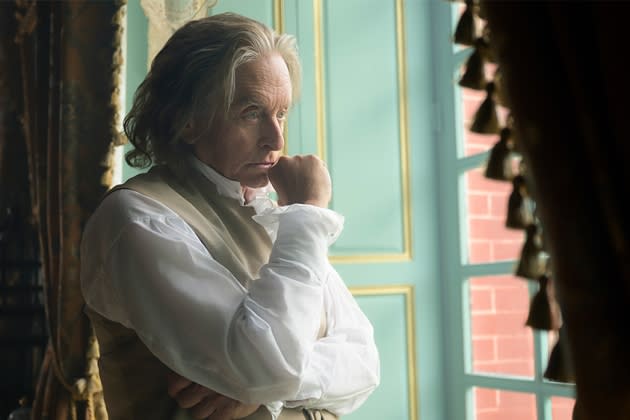From ‘Franklin’ to ‘Raise the Dead,’ France Entices With Competitive Tax Rebates and Iconic Locales

If once lured for brief visits by the panoply of iconic locations, international projects now linger in France to claim a competitive tax rebate and set down roots to benefit from an ever-expanding production infrastructure.
And so, fuelled by mammoth shoots like Apple TV+’s upcoming Benjamin Franklin in Paris limited series, “Franklin,” the Christian Dior-Coco Chanel bio-series “The New Look” and AMC’s “Walking Dead” spinoff “Raise the Dead,” foreign spending hit a record high last year, filling local coffers with slightly more than $1 billion and marking a 324% increase from 2019 numbers.
More from Variety
“This is more than a post-pandemic rebound,” says France’s National Centre for Cinema and the Moving Image (CNC) digital director Vincent Florant. “[The industry has undergone] rapid acceleration and exponential growth. Nowadays, we host the totality of these massive shoots, whereas before we only received a part, or even, in the most extreme cases, just a few days of postcard shooting at the foot of the Eiffel Tower.”
Offering an across-the-board 30% rebate, with an additional 10% bonus to productions that partner with local VFX houses, the country’s Tax Rebate for Intl. Productions (TRIP) scheme has played an outsized role in attracting these foreign shoots, while a string of investments into physical infrastructure has kept visitors comfortable on-site.
The publication of a 2019 white paper urging greater soundstage development has since yielded exponential public investment, with a $1.1 million amuse-bouche in 2020 leading to an $11 million “modernization” plan in 2021 before giving way to this year’s main feast — a $387 million investment into soundstages, backlots, digital facilities and VFX houses umbrellaed under French president Emmanuel Macron’s larger France 2030 infrastructure omnibus.
“The plan will double our capacity,” says Florant. “New and better training programs will ease shortages of manpower, while a set of green and eco-responsible mandates will help studios reduce their carbon footprint. With this plan, France can become a global leader in audiovisual production.”
Whittled down from 175 proposals and voted on by an industry jury led by “The Stronghold” director Cédric Jimenez, the three-dozen or so France 2030 supported projects (with roughly 10 production facilities and twice as many digital studios) will only be named later this spring, but previous waves of investment have already reshaped the terrain in marked ways.
Located just outside of Marseille, Martigue-based Provence Studios, for example, used funds from the 2021 modernization push to build two additional 16,000-square-foot stages. Since their completion, the two new stages have played home to both seasons of the Starz Catherine de’ Medici drama “The Serpent Queen,” and will continue to host productions until July of this year.
Indeed, given its wealth of historical sites, France has always been — and remains — a natural (and often busy) destination for costume dramas and period epics, so the growing emphasis on studio sets has helped ease logjams in high-traffic areas. As popular with global tourists as with international location scouts, the
Château de Versailles, for one, holds the public at bay but once a week, opening exclusively for productions every Monday.
Projects like this year’s Cannes opener “Jeanne du Barry,” the Canal Plus drama “Marie Antoinette” and Apple TV+’s “Franklin” have shot in and around national heritage sites like the Versailles grounds, the Château de Chambord, and the gardens of Paris’ Palais-Royal when possible, and returning to large-scale suburban production facilities when not.
When it comes to wringing value, international titles can also look to production service facilitators with detailed knowledge of the terrain. When prepping the spinoff “Raise the Dead,” which shot between October and March, veteran line producer Raphael Benoliel (“John Wick 4”) took advantage of the winter lull, turning the gray beaches of Normandy and the unmanned ramparts of Mont Saint-Michel into chilly visions of a post-apocalyptic future, pulling narrative heft from locations in the off-season.
When realizing more contemporary and cosmopolitan visions — like Season 4 of “Emily in Paris,” which is set to shoot next year — upcoming productions might also rely on a number of elements meant to ease congestion in the City of Light, with information about studio backlots boasting Parisian street mockups, production facilities with LED virtual sets and a country-wide locations database all available through the Film France portal.
“We are a one-stop shop,” says Film France chief Daphné Lora. “We advise, support and redirect, assisting with the tax rebate, connecting international productions to local line producers and securing both shooting permits and visas for the cast and crew. And we can connect specific requests to our network of 34 regional film commissions [across the French territory].”
While next year’s Olympic Games will no doubt levy additional stresses on Paris and the surrounding region, Lora and her team want to assuage international partners, putting together a location guide of country-wide stand-ins for the capital city and an updated list of available studio spaces throughout next summer.
“[Of course] areas near the Olympic sites will be effected during and around the competition,” Lora grants. “But studios will be available for productions and we will not see much disruption in the rest of the country. We want to send the message that France remains open for filming in 2024.”
Best of Variety
'House of the Dragon': Every Character and What You Need to Know About the 'Game of Thrones' Prequel
Sign up for Variety’s Newsletter. For the latest news, follow us on Facebook, Twitter, and Instagram.
